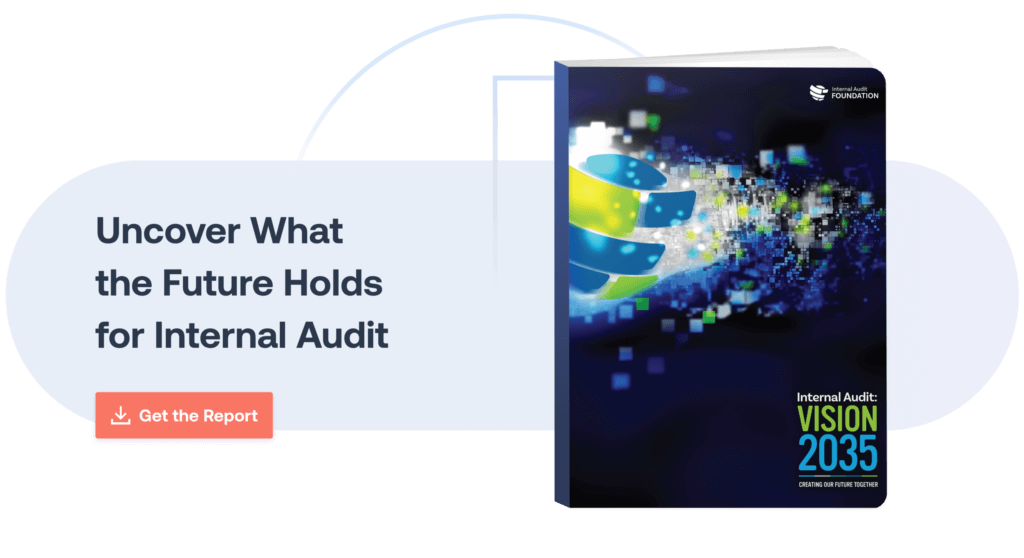
July 15, 2024 • 7 min read
Top Takeaways From the Internal Audit: Vision 2035 Report
In an era of rapid technological advancement and evolving risks, internal audit stands at a crossroads. What emerging technology will revolutionize internal audit by 2035? Which traditional audit skill will become obsolete in the next decade? How will the role of internal auditors transform in an AI-driven future?
The Internal Audit Foundation’s groundbreaking Internal Audit: Vision 2035 report, sponsored by AuditBoard, tackles these pressing questions head-on. Drawing insights from over 7,000 professionals, this comprehensive study maps out a forward-thinking path for the internal audit profession, emphasizing innovation, skill enhancement, and strategic foresight.
Are you prepared for the seismic shifts coming to internal audit? Download your copy of the full report to uncover the answers to these questions and explore key insights that will shape the future of the profession.
Takeaway 1: Embracing Technological Advancements
The future of internal audit hinges on leveraging new technologies. AI and machine learning are at the forefront, with 92% of respondents agreeing these tools add significant value. The impact is clear: 97% of professionals cite increasing data volumes and complexity as a key technological outcome.

Technology adoption isn’t just about tools — it’s about enhancing auditor skills. A staggering 96% of respondents emphasize the need for experienced auditors to upskill to remain relevant. By embracing these technologies, internal audit can improve engagement quality and uncover new opportunities to add value.
Respondents across all regions and roles indicated that new technologies would influence how internal auditors perform their work, improve the quality of engagements, and provide new opportunities to add value. As data volumes explode, the ability to harness and interpret vast amounts of information will become a pivotal skill for auditors.
Takeaway 2: Expanding Data Analytics Capabilities
Data analytics is no longer optional. It’s now a cornerstone of modern internal audit. The Vision 2035 survey reveals that 91% of respondents rate data analytics as extremely or very important for the profession’s future. Advanced analytics tools enable auditors to efficiently analyze large datasets, uncovering patterns and insights that traditional methods might miss.

Continuous monitoring systems are gaining traction, with 27% of respondents implementing them at a high level. These systems provide real-time insights, allowing internal auditors to detect issues early and offer timely, strategic advice.
Advanced or high-level implementation of technology tools, such as continuous monitoring and data analytics, is crucial for the future of internal audit. This capability will allow auditors to provide more dynamic and immediate feedback, enhancing risk management and supporting informed decision-making across the organization.
Takeaway 3: Developing Cybersecurity Expertise
In an era of escalating cyberthreats, internal auditors must step up their game. Cybersecurity tops the list of areas expected to expand in future audit scopes.

To meet this challenge, internal auditors need to conduct comprehensive cyber risk assessments and develop robust incident response plans. Staying updated on the latest threats and mitigation strategies is a critical skill for protecting organizational assets.
Internal auditors’ competencies apply to assessing various types of risk and analyzing diverse situations. They must recognize these strengths, build upon them, and be ready to use them in new business contexts.
Takeaway 4: Adopting Agile Auditing Methods
Flexibility and responsiveness are key in today’s dynamic risk environment. Agile auditing methods enable internal audit functions to adapt quickly to changing landscapes and emerging risks. The report emphasizes that incorporating organizational strategy into audit services is fundamental for adding value.
Looking ahead, 79% of respondents anticipate an expansion of advisory work. Survey results indicate that the future ideal state is a balance of 59% assurance and 41% advisory services, reflecting the evolving role of internal auditors.

This shift towards more proactive and strategic roles aligns perfectly with agile methodologies, allowing auditors to address emerging risks and provide timely insights. This adaptability ensures that internal audit remains a vital, forward-thinking component of the organization’s risk management strategy.
Takeaway 5: Investing in Skill Development
In a rapidly evolving profession, continuous learning is non-negotiable. The Internal Audit: Vision 2035 report underscores the need for ongoing professional development, particularly in technology. Adaptability and learning agility are ranked among the most important skill sets, both now (56%) and in the future (48%).

Internal auditors must develop a broad skill set encompassing data analytics, cybersecurity, and strategic advisory capabilities. This comprehensive approach to skill development ensures that internal audit can meet the evolving demands of their roles and continue to add value to their organizations.
Continuous upskilling (learning) will need to occur at a fast pace and internal auditors will have to apply their new knowledge quickly. Because internal auditors cannot feasibly become experts in all areas where they provide assurance and advisory services, they must learn how to rapidly leverage internal and external knowledge effectively. While not without challenges, this environment offers opportunities for greater collaboration with other professionals inside and outside the organization.
For an in-depth exploration of the report’s insights and practical recommendations, download the full Internal Audit: Vision 2035 and equip your audit team for future success.
You may also like to read


AuditBoard and IAF report: The more you know about AI-enabled fraud, the better equipped you are to fight it

Audit reporting best practices: Guide for audit leaders

Boards are struggling with AI oversight. How internal auditors can help

AuditBoard and IAF report: The more you know about AI-enabled fraud, the better equipped you are to fight it

Audit reporting best practices: Guide for audit leaders
Discover why industry leaders choose AuditBoard
SCHEDULE A DEMO




